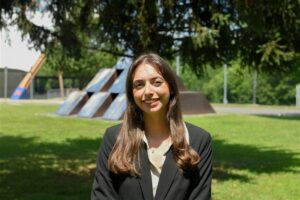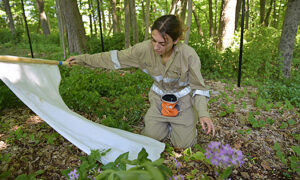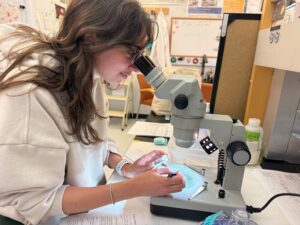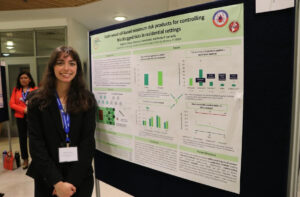Sophia Chiaia found her calling in high school and capitalized on it at WCSU

Sophia Chiaia
All it took was one AP Biology class, and Bethel High School student Sophia Chiaia knew that she had found exactly what she wanted to do. “Every time I went to class, we were exposed to something different,” she said. “In Biology, there is so much to learn and I really loved the class and knew I had to go into Biology as a career.”
Her major decided, Chiaia had to figure out where she wanted to study. She said she applied to a lot of local schools because she wanted to be close to home. When she learned that Western Connecticut State University would offer her a Presidential Scholarship as a member of the Kathwari Honors Program, the decision was made. “Accepting the scholarship and studying at WestConn seemed like the right thing to do,” she said. “And I’m so glad it was the choice that I made.”
As a Biology major and Chemistry minor, Chiaia assessed her options on campus, and soon heard about the Tickborne Disease Prevention Laboratory run by Professor of Biology Dr. Neeta Connally. “I was really excited about the opportunity to do hands-on research and work with Neeta,” Chiai said.
As a Tick Lab research assistant, Chiaia has been looking at the effectiveness of cedarwood oil for tick control in backyards. “It’s not regulated by the EPA so there’s a lack of research,” she explained. “It’s natural, so a lot of people are using it, but there’s no evidence that it’s effective in a residential setting. I hope my research will shine some light into these products’ effectiveness and can be published, so that we’ll have something in the literature about the safety and efficacy of cedarwood oil in the backyard.”

Sophia Chiaia collecting ticks.
In addition to conducting field research by flagging, or dragging flannel to collect black-legged ticks, Chiaia also has gained considerable laboratory experience. “I have been identifying collected ticks by stage, species, and sex, and sending them with our research partners at UMass Amherst to get tested for different disease-causing pathogens,” she said. WCSU and UMass are both participants in the New England Regional Center of Excellence in Vector-Borne Diseases, which is conducting federally funded research.
Chiaia has shared her findings at numerous conferences, both on campus and off. As an undergraduate, she made the following presentations: “Putting the puzzle pieces together: Assessing risk of human exposure to blacklegged ticks,” presented at the Entomological Society of America Conference in Vancouver, Canada, 2023; “The Effect of the foraging Gene of Drosophila melanogaster on Sperm Storage, Egg Laying, and Hatchability,” presented in conjunction with the SURF program at WCSU and the REU program at the University of Connecticut, 2023; and “Putting the puzzle pieces together: Assessing risk of human exposure to blacklegged ticks,” presented at Western Research Day through the WCSU Tick Lab, 2022.

Sophia Chiaia in the lab.
Chiaia graduated with a Bachelor of Science in Biology with a minor in Chemistry and a 3.96 GPA in 2023 after only three years. In that time, she had accumulated numerous achievements, including being named to the Dean’s List every semester. She then applied to WCSU’s Master of Science in Biological Diversity program, where she has amassed additional honors. Among her many accomplishments have been receiving the Most Promising Biology Student Award and Sigma Xi Scientific Research Honor Society Chapter Award in 2022, the receipt of a Summer Internship Research Fellowship (SURF) Award in 2023, the C. Thomas Philbrick Student Research Award in 2024, and the 2025 Western Research Day Provost’s Award. She also was a member of the Herpetology and Biology clubs, serving as president of the Biology Club for a semester.
Her participation in research conferences has continued as a graduate student as well, and she has made the following presentations: “Assessing the effectiveness of cedarwood oil-based minimum risk products for controlling blacklegged ticks in residential settings,” presented at Western Research Day through the WCSU Tick Lab, 2025; “Assessing cedarwood oil-based minimum risk pesticides for controlling residential blacklegged ticks,” presented at the Northeast Natural History Conference in Springfield, Massachusetts, 2025; and “Assessing the efficacy of cedarwood oil-based minimum risk pesticides for controlling blacklegged ticks in residential settings,” presented at the Entomological Society of America Conference in Phoenix, Arizona, 2024.

Sophia Chiaia presenting her findings at Western Research Day.
She also will attend the 2025 International Conference: Lyme Borreliosis and Other Tick-Borne Diseases in Chicago, Illinois, for a poster pitch; and the Eastern Branch 2026 Meeting for the Entomological Society of America in Saratoga Springs, New York.
Once she obtains her master’s degree in Integrative Biological Diversity, Chiaia has her eye on a Ph.D. “I’m really looking all over the northeast for a program that I want to join,” she said. “My hope is that attending and presenting at so many conferences will provide me networking opportunities and the ability to connect with a future adviser.”
Reflecting on her journey from that AP Biology class at Bethel High School, Chiaia acknowledges her teacher, Ms. Leary, and her eighth-grade teacher, Ms. Chiafari. In her current role as a graduate student in Biology, Chiaia said, “WCSU’s Biology Department is amazing. Dr. Connally is my adviser and she and the rest of the faculty are so empowering and passionate. You’re going to learn so much and be exposed to some incredible professors. In literally every class, you will learn something interesting that will stay with you. I would highly recommend it.”
Western Connecticut State University changes lives by providing all students with a high-quality education that fosters their growth as individuals, scholars, professionals and leaders in a global society. Our vision: To be widely recognized as a premier public university with outstanding teachers and scholars who prepare students to contribute to the world in a meaningful way.

